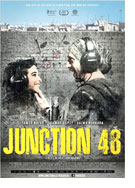

Opening 19 Jan 2017
Directed by:
Udi Aloni
Writing credits:
Oren Moverman, Tamer Nafar
Principal actors:
Tamer Nafar, Samar Oupty, Salwa Nakkara, Saeed Dassuki
Kareem (Nafar) is an on-going hip hop singer and entertains his friends in small venues. He dreams of the big break to stardom; a success he would share with girlfriend Manar (Qupty), who could also become successful in the world of hip hop. In real life he works in a call center and his friends are more successful dealing in drugs. His parents suffer a terrible car accident; his father dies and his mother is doomed to life in a wheel chair. Kareem and his brother help wherever possible. They also support their friend Talal and his father Abu Abdallah whose house is to be dismantled to make way for an Israeli Museum of Coexistence.
This simple story grows with new meaning when one researches the background. Lod, also known as Lyd, is located about 10 miles east of Tel Aviv. Its history goes back thousands of years BC and was originally Arabic. The “Junction” in the title refers to a major railway junction in the town, which unites parts of Israel and Palestine. The “48” refers to the Palestinian War in 1948, with the exit of British influence and the founding of Israel as we know it today. The Palestinians lost much of their property and many of their rights, a fact which is still being evaluated today, e.g., the recent UN resolution not to recognize the Israeli settlements in Arab territory. In real life Tamer Nafar, born in Lod, was the first Arabian hip hop artist and together with his brother Suhell and a friend, Mahmoud Jrere, established the first Palestine-Arab rap formation called DAM. He claims to be unpolitical, but his texts definitely send a message. This was a first leading role for Samar Qupty as Manar and the first time she has sung in public. In the film Manar’s cousins observe her every movement in order to “preserve her honor” until they can marry her off to the best candidate. Sing in public? On stage? Never! This reflects the situation of the rights of women in the area. The idea of depriving Palestinians of their real estate in order to build for the Israeli public good is not new. The University of Tel Aviv sits on a ruined Palestinian village; there is a Dadaism Art Museum in a Palestinian house, whose owners were forced to move. The Museum of Tolerance in Jerusalem sits on a former Palestinian cemetery (all facts according to the film press information).
The film is a wonderful example of how the two countries could work for the betterment of both nationalities in that director Udi Aloni and writer Oren Moverman, as well as producer David Silber are all Israelis. They worked well with the Palestinian cast, taking time to discuss the situation and the story, in order to present the problems close to reality. Junction 48 showed at many film festivals worldwide, including Tribeca and the Berlinale, where it won the audience award in the section Panorama Special. We need more films like this. The last one that I was familiar with, before Junction 48, was Cinema Jenin – The Story of a Dream, a documentary which opened in 2011 and showed the struggle to preserve a West Jordan cinema dedicated to Arabian films, a source of culture for the residents. Five years later, it, too, has been torn down to make way for a shopping center. (Becky Tan)